Entrepreneurship and Self-Efficacy: Key Concepts and Differences
VerifiedAdded on 2023/05/31
|8
|2026
|322
Essay
AI Summary
This essay delves into the realm of entrepreneurship, highlighting the critical role of self-efficacy in achieving success in independent business ventures. It distinguishes between entrepreneurs and business owners, emphasizing the innovative drive and risk-taking propensity of entrepreneurs compared to the profit-oriented focus of business owners. The essay explores how self-efficacy, rooted in social cognitive theory, empowers entrepreneurs to assess their capabilities, set ambitious goals, and navigate challenges effectively. While acknowledging potential drawbacks of overconfidence, the analysis concludes that self-efficacy is a cornerstone for enhancing cognitive skills and fostering successful entrepreneurial performance. Desklib provides a platform for students to access this essay and a wealth of study tools to further their understanding of entrepreneurship and related concepts.

Running head: ENTREPRENEURSHIP
Entrepreneurship
Name of the student:
Name of the university:
Author note:
Entrepreneurship
Name of the student:
Name of the university:
Author note:
Paraphrase This Document
Need a fresh take? Get an instant paraphrase of this document with our AI Paraphraser
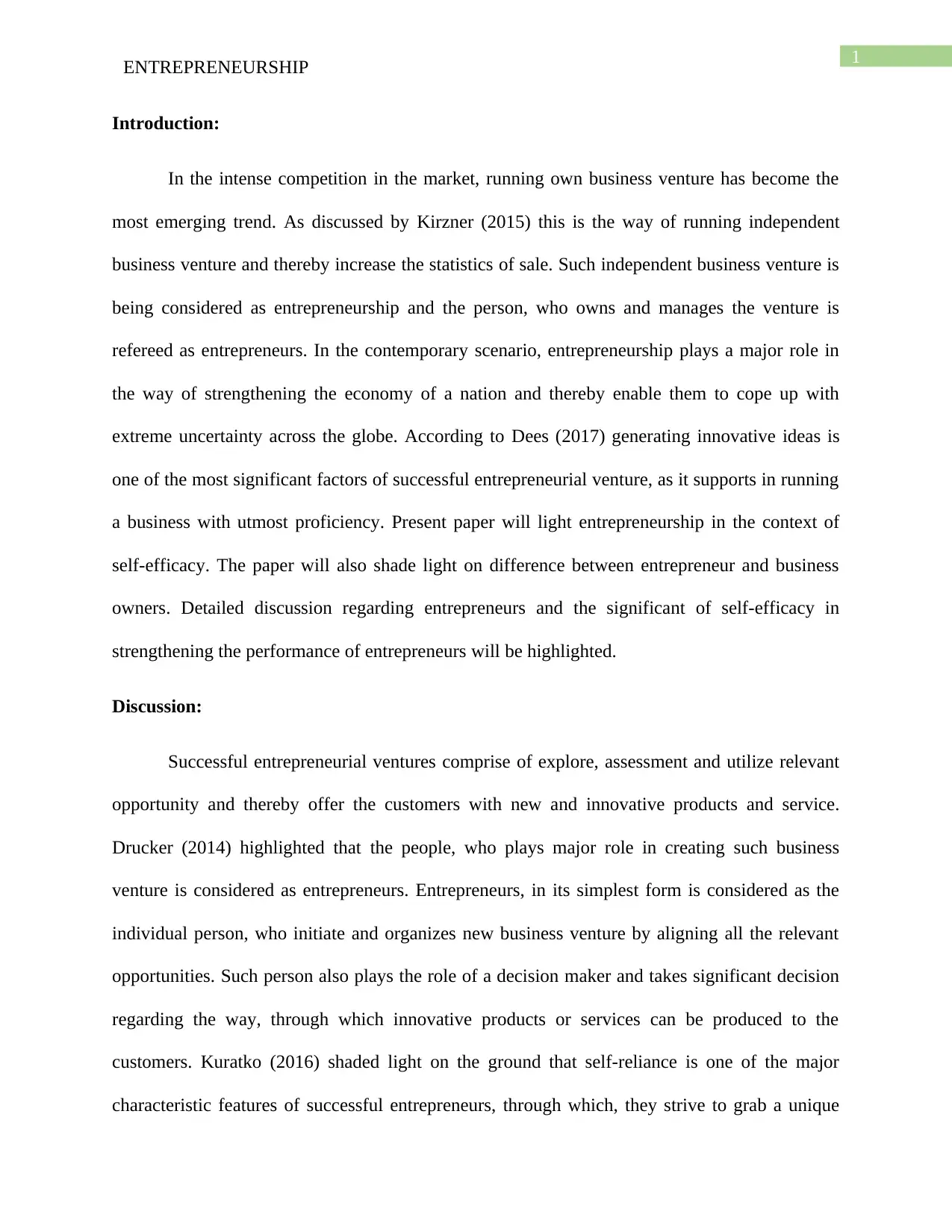
1
ENTREPRENEURSHIP
Introduction:
In the intense competition in the market, running own business venture has become the
most emerging trend. As discussed by Kirzner (2015) this is the way of running independent
business venture and thereby increase the statistics of sale. Such independent business venture is
being considered as entrepreneurship and the person, who owns and manages the venture is
refereed as entrepreneurs. In the contemporary scenario, entrepreneurship plays a major role in
the way of strengthening the economy of a nation and thereby enable them to cope up with
extreme uncertainty across the globe. According to Dees (2017) generating innovative ideas is
one of the most significant factors of successful entrepreneurial venture, as it supports in running
a business with utmost proficiency. Present paper will light entrepreneurship in the context of
self-efficacy. The paper will also shade light on difference between entrepreneur and business
owners. Detailed discussion regarding entrepreneurs and the significant of self-efficacy in
strengthening the performance of entrepreneurs will be highlighted.
Discussion:
Successful entrepreneurial ventures comprise of explore, assessment and utilize relevant
opportunity and thereby offer the customers with new and innovative products and service.
Drucker (2014) highlighted that the people, who plays major role in creating such business
venture is considered as entrepreneurs. Entrepreneurs, in its simplest form is considered as the
individual person, who initiate and organizes new business venture by aligning all the relevant
opportunities. Such person also plays the role of a decision maker and takes significant decision
regarding the way, through which innovative products or services can be produced to the
customers. Kuratko (2016) shaded light on the ground that self-reliance is one of the major
characteristic features of successful entrepreneurs, through which, they strive to grab a unique
ENTREPRENEURSHIP
Introduction:
In the intense competition in the market, running own business venture has become the
most emerging trend. As discussed by Kirzner (2015) this is the way of running independent
business venture and thereby increase the statistics of sale. Such independent business venture is
being considered as entrepreneurship and the person, who owns and manages the venture is
refereed as entrepreneurs. In the contemporary scenario, entrepreneurship plays a major role in
the way of strengthening the economy of a nation and thereby enable them to cope up with
extreme uncertainty across the globe. According to Dees (2017) generating innovative ideas is
one of the most significant factors of successful entrepreneurial venture, as it supports in running
a business with utmost proficiency. Present paper will light entrepreneurship in the context of
self-efficacy. The paper will also shade light on difference between entrepreneur and business
owners. Detailed discussion regarding entrepreneurs and the significant of self-efficacy in
strengthening the performance of entrepreneurs will be highlighted.
Discussion:
Successful entrepreneurial ventures comprise of explore, assessment and utilize relevant
opportunity and thereby offer the customers with new and innovative products and service.
Drucker (2014) highlighted that the people, who plays major role in creating such business
venture is considered as entrepreneurs. Entrepreneurs, in its simplest form is considered as the
individual person, who initiate and organizes new business venture by aligning all the relevant
opportunities. Such person also plays the role of a decision maker and takes significant decision
regarding the way, through which innovative products or services can be produced to the
customers. Kuratko (2016) shaded light on the ground that self-reliance is one of the major
characteristic features of successful entrepreneurs, through which, they strive to grab a unique
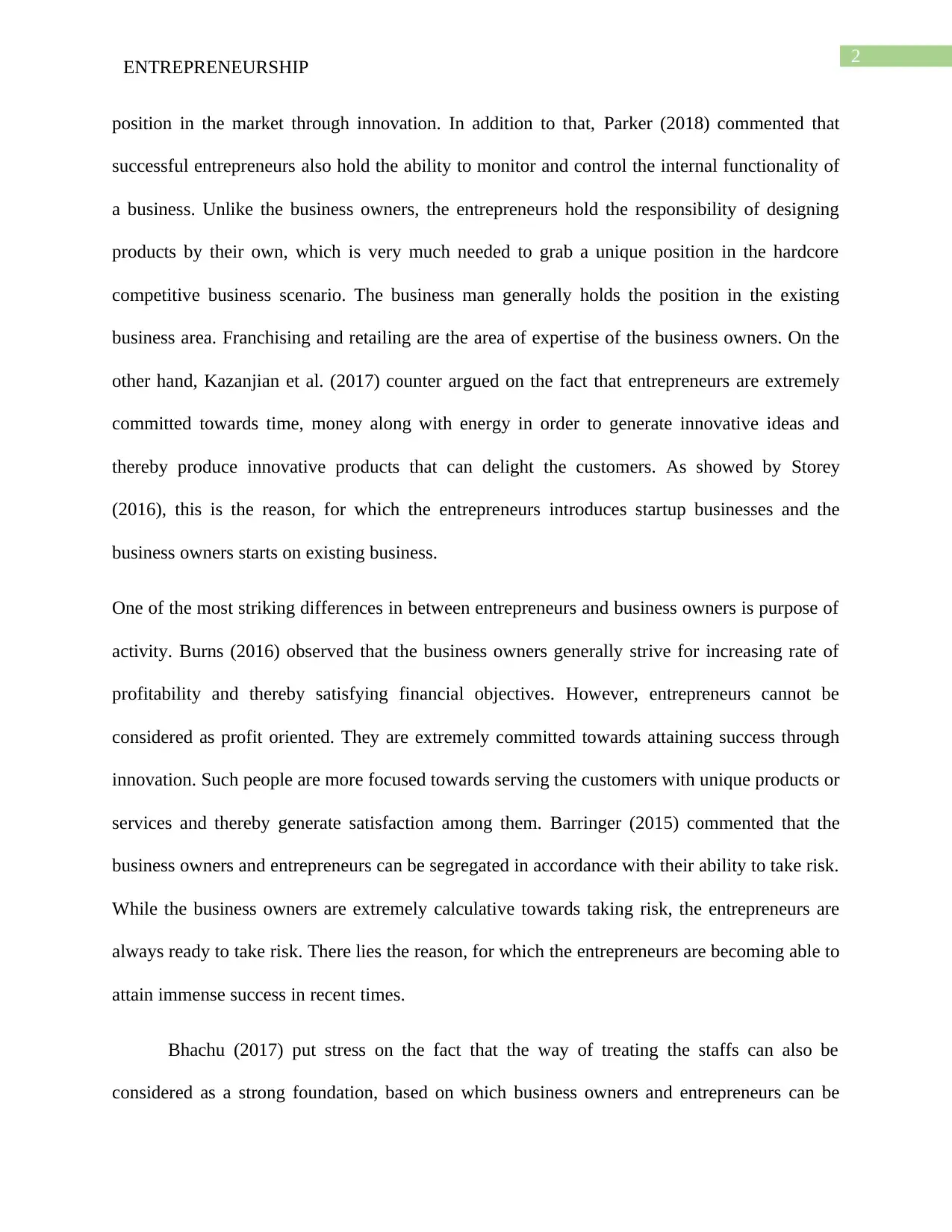
2
ENTREPRENEURSHIP
position in the market through innovation. In addition to that, Parker (2018) commented that
successful entrepreneurs also hold the ability to monitor and control the internal functionality of
a business. Unlike the business owners, the entrepreneurs hold the responsibility of designing
products by their own, which is very much needed to grab a unique position in the hardcore
competitive business scenario. The business man generally holds the position in the existing
business area. Franchising and retailing are the area of expertise of the business owners. On the
other hand, Kazanjian et al. (2017) counter argued on the fact that entrepreneurs are extremely
committed towards time, money along with energy in order to generate innovative ideas and
thereby produce innovative products that can delight the customers. As showed by Storey
(2016), this is the reason, for which the entrepreneurs introduces startup businesses and the
business owners starts on existing business.
One of the most striking differences in between entrepreneurs and business owners is purpose of
activity. Burns (2016) observed that the business owners generally strive for increasing rate of
profitability and thereby satisfying financial objectives. However, entrepreneurs cannot be
considered as profit oriented. They are extremely committed towards attaining success through
innovation. Such people are more focused towards serving the customers with unique products or
services and thereby generate satisfaction among them. Barringer (2015) commented that the
business owners and entrepreneurs can be segregated in accordance with their ability to take risk.
While the business owners are extremely calculative towards taking risk, the entrepreneurs are
always ready to take risk. There lies the reason, for which the entrepreneurs are becoming able to
attain immense success in recent times.
Bhachu (2017) put stress on the fact that the way of treating the staffs can also be
considered as a strong foundation, based on which business owners and entrepreneurs can be
ENTREPRENEURSHIP
position in the market through innovation. In addition to that, Parker (2018) commented that
successful entrepreneurs also hold the ability to monitor and control the internal functionality of
a business. Unlike the business owners, the entrepreneurs hold the responsibility of designing
products by their own, which is very much needed to grab a unique position in the hardcore
competitive business scenario. The business man generally holds the position in the existing
business area. Franchising and retailing are the area of expertise of the business owners. On the
other hand, Kazanjian et al. (2017) counter argued on the fact that entrepreneurs are extremely
committed towards time, money along with energy in order to generate innovative ideas and
thereby produce innovative products that can delight the customers. As showed by Storey
(2016), this is the reason, for which the entrepreneurs introduces startup businesses and the
business owners starts on existing business.
One of the most striking differences in between entrepreneurs and business owners is purpose of
activity. Burns (2016) observed that the business owners generally strive for increasing rate of
profitability and thereby satisfying financial objectives. However, entrepreneurs cannot be
considered as profit oriented. They are extremely committed towards attaining success through
innovation. Such people are more focused towards serving the customers with unique products or
services and thereby generate satisfaction among them. Barringer (2015) commented that the
business owners and entrepreneurs can be segregated in accordance with their ability to take risk.
While the business owners are extremely calculative towards taking risk, the entrepreneurs are
always ready to take risk. There lies the reason, for which the entrepreneurs are becoming able to
attain immense success in recent times.
Bhachu (2017) put stress on the fact that the way of treating the staffs can also be
considered as a strong foundation, based on which business owners and entrepreneurs can be
⊘ This is a preview!⊘
Do you want full access?
Subscribe today to unlock all pages.

Trusted by 1+ million students worldwide
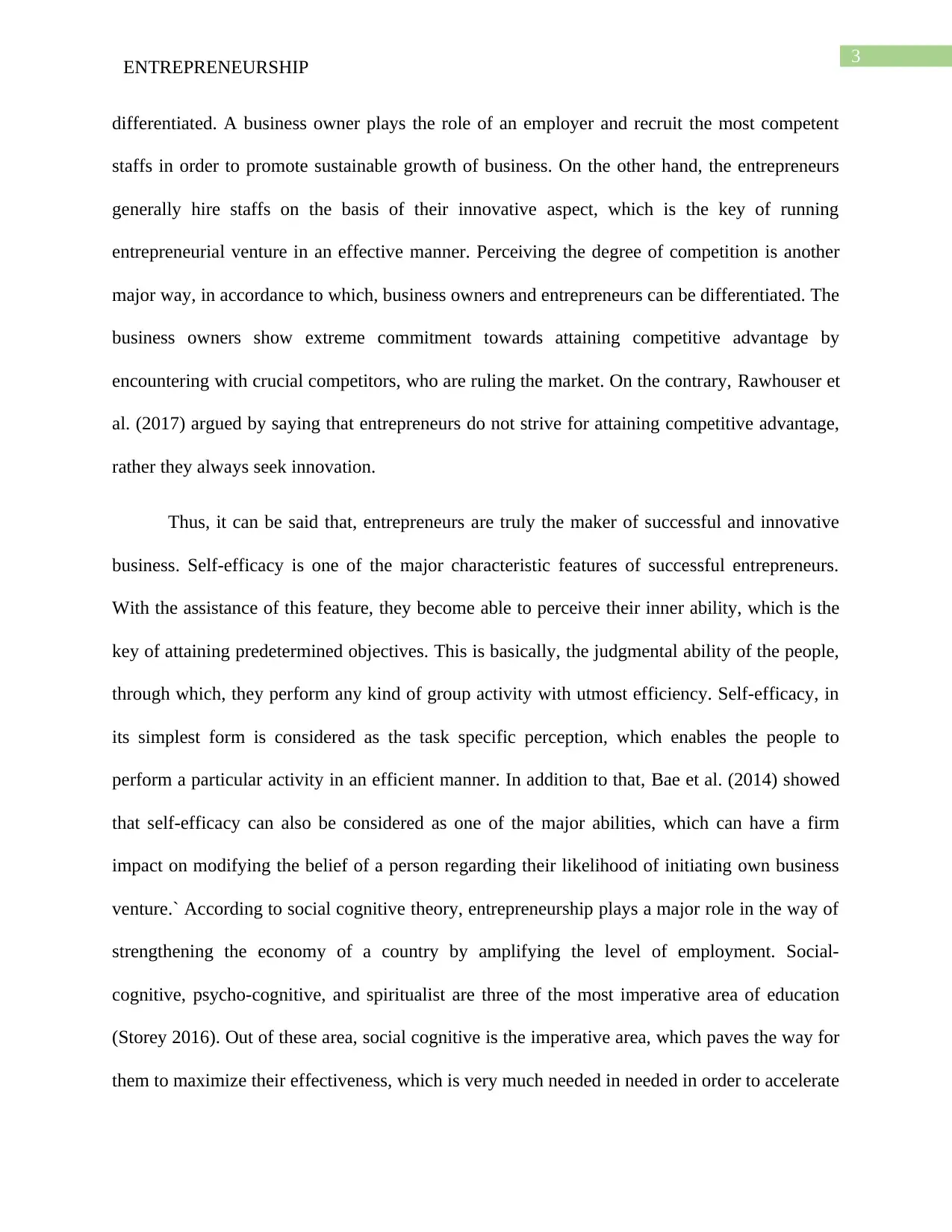
3
ENTREPRENEURSHIP
differentiated. A business owner plays the role of an employer and recruit the most competent
staffs in order to promote sustainable growth of business. On the other hand, the entrepreneurs
generally hire staffs on the basis of their innovative aspect, which is the key of running
entrepreneurial venture in an effective manner. Perceiving the degree of competition is another
major way, in accordance to which, business owners and entrepreneurs can be differentiated. The
business owners show extreme commitment towards attaining competitive advantage by
encountering with crucial competitors, who are ruling the market. On the contrary, Rawhouser et
al. (2017) argued by saying that entrepreneurs do not strive for attaining competitive advantage,
rather they always seek innovation.
Thus, it can be said that, entrepreneurs are truly the maker of successful and innovative
business. Self-efficacy is one of the major characteristic features of successful entrepreneurs.
With the assistance of this feature, they become able to perceive their inner ability, which is the
key of attaining predetermined objectives. This is basically, the judgmental ability of the people,
through which, they perform any kind of group activity with utmost efficiency. Self-efficacy, in
its simplest form is considered as the task specific perception, which enables the people to
perform a particular activity in an efficient manner. In addition to that, Bae et al. (2014) showed
that self-efficacy can also be considered as one of the major abilities, which can have a firm
impact on modifying the belief of a person regarding their likelihood of initiating own business
venture.` According to social cognitive theory, entrepreneurship plays a major role in the way of
strengthening the economy of a country by amplifying the level of employment. Social-
cognitive, psycho-cognitive, and spiritualist are three of the most imperative area of education
(Storey 2016). Out of these area, social cognitive is the imperative area, which paves the way for
them to maximize their effectiveness, which is very much needed in needed in order to accelerate
ENTREPRENEURSHIP
differentiated. A business owner plays the role of an employer and recruit the most competent
staffs in order to promote sustainable growth of business. On the other hand, the entrepreneurs
generally hire staffs on the basis of their innovative aspect, which is the key of running
entrepreneurial venture in an effective manner. Perceiving the degree of competition is another
major way, in accordance to which, business owners and entrepreneurs can be differentiated. The
business owners show extreme commitment towards attaining competitive advantage by
encountering with crucial competitors, who are ruling the market. On the contrary, Rawhouser et
al. (2017) argued by saying that entrepreneurs do not strive for attaining competitive advantage,
rather they always seek innovation.
Thus, it can be said that, entrepreneurs are truly the maker of successful and innovative
business. Self-efficacy is one of the major characteristic features of successful entrepreneurs.
With the assistance of this feature, they become able to perceive their inner ability, which is the
key of attaining predetermined objectives. This is basically, the judgmental ability of the people,
through which, they perform any kind of group activity with utmost efficiency. Self-efficacy, in
its simplest form is considered as the task specific perception, which enables the people to
perform a particular activity in an efficient manner. In addition to that, Bae et al. (2014) showed
that self-efficacy can also be considered as one of the major abilities, which can have a firm
impact on modifying the belief of a person regarding their likelihood of initiating own business
venture.` According to social cognitive theory, entrepreneurship plays a major role in the way of
strengthening the economy of a country by amplifying the level of employment. Social-
cognitive, psycho-cognitive, and spiritualist are three of the most imperative area of education
(Storey 2016). Out of these area, social cognitive is the imperative area, which paves the way for
them to maximize their effectiveness, which is very much needed in needed in order to accelerate
Paraphrase This Document
Need a fresh take? Get an instant paraphrase of this document with our AI Paraphraser
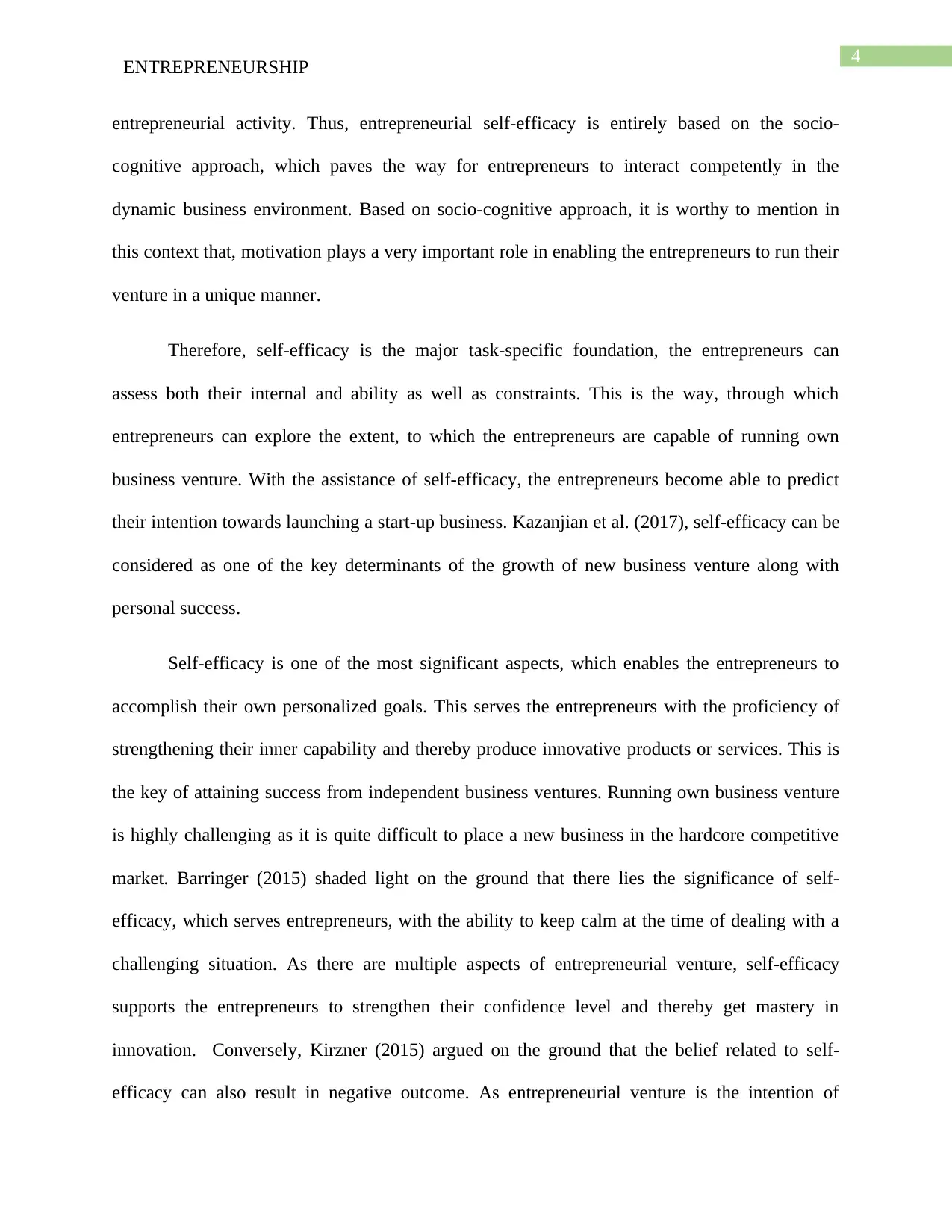
4
ENTREPRENEURSHIP
entrepreneurial activity. Thus, entrepreneurial self-efficacy is entirely based on the socio-
cognitive approach, which paves the way for entrepreneurs to interact competently in the
dynamic business environment. Based on socio-cognitive approach, it is worthy to mention in
this context that, motivation plays a very important role in enabling the entrepreneurs to run their
venture in a unique manner.
Therefore, self-efficacy is the major task-specific foundation, the entrepreneurs can
assess both their internal and ability as well as constraints. This is the way, through which
entrepreneurs can explore the extent, to which the entrepreneurs are capable of running own
business venture. With the assistance of self-efficacy, the entrepreneurs become able to predict
their intention towards launching a start-up business. Kazanjian et al. (2017), self-efficacy can be
considered as one of the key determinants of the growth of new business venture along with
personal success.
Self-efficacy is one of the most significant aspects, which enables the entrepreneurs to
accomplish their own personalized goals. This serves the entrepreneurs with the proficiency of
strengthening their inner capability and thereby produce innovative products or services. This is
the key of attaining success from independent business ventures. Running own business venture
is highly challenging as it is quite difficult to place a new business in the hardcore competitive
market. Barringer (2015) shaded light on the ground that there lies the significance of self-
efficacy, which serves entrepreneurs, with the ability to keep calm at the time of dealing with a
challenging situation. As there are multiple aspects of entrepreneurial venture, self-efficacy
supports the entrepreneurs to strengthen their confidence level and thereby get mastery in
innovation. Conversely, Kirzner (2015) argued on the ground that the belief related to self-
efficacy can also result in negative outcome. As entrepreneurial venture is the intention of
ENTREPRENEURSHIP
entrepreneurial activity. Thus, entrepreneurial self-efficacy is entirely based on the socio-
cognitive approach, which paves the way for entrepreneurs to interact competently in the
dynamic business environment. Based on socio-cognitive approach, it is worthy to mention in
this context that, motivation plays a very important role in enabling the entrepreneurs to run their
venture in a unique manner.
Therefore, self-efficacy is the major task-specific foundation, the entrepreneurs can
assess both their internal and ability as well as constraints. This is the way, through which
entrepreneurs can explore the extent, to which the entrepreneurs are capable of running own
business venture. With the assistance of self-efficacy, the entrepreneurs become able to predict
their intention towards launching a start-up business. Kazanjian et al. (2017), self-efficacy can be
considered as one of the key determinants of the growth of new business venture along with
personal success.
Self-efficacy is one of the most significant aspects, which enables the entrepreneurs to
accomplish their own personalized goals. This serves the entrepreneurs with the proficiency of
strengthening their inner capability and thereby produce innovative products or services. This is
the key of attaining success from independent business ventures. Running own business venture
is highly challenging as it is quite difficult to place a new business in the hardcore competitive
market. Barringer (2015) shaded light on the ground that there lies the significance of self-
efficacy, which serves entrepreneurs, with the ability to keep calm at the time of dealing with a
challenging situation. As there are multiple aspects of entrepreneurial venture, self-efficacy
supports the entrepreneurs to strengthen their confidence level and thereby get mastery in
innovation. Conversely, Kirzner (2015) argued on the ground that the belief related to self-
efficacy can also result in negative outcome. As entrepreneurial venture is the intention of
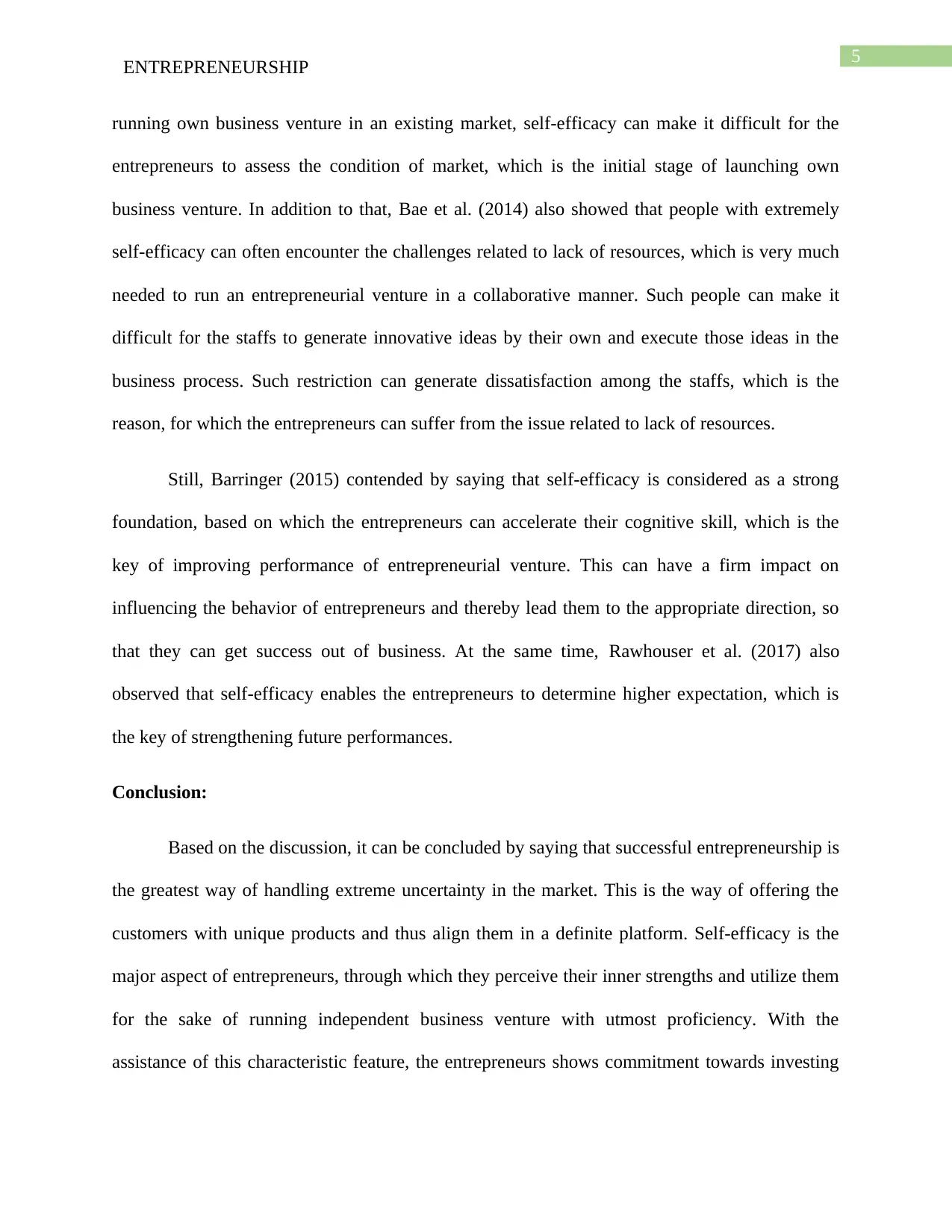
5
ENTREPRENEURSHIP
running own business venture in an existing market, self-efficacy can make it difficult for the
entrepreneurs to assess the condition of market, which is the initial stage of launching own
business venture. In addition to that, Bae et al. (2014) also showed that people with extremely
self-efficacy can often encounter the challenges related to lack of resources, which is very much
needed to run an entrepreneurial venture in a collaborative manner. Such people can make it
difficult for the staffs to generate innovative ideas by their own and execute those ideas in the
business process. Such restriction can generate dissatisfaction among the staffs, which is the
reason, for which the entrepreneurs can suffer from the issue related to lack of resources.
Still, Barringer (2015) contended by saying that self-efficacy is considered as a strong
foundation, based on which the entrepreneurs can accelerate their cognitive skill, which is the
key of improving performance of entrepreneurial venture. This can have a firm impact on
influencing the behavior of entrepreneurs and thereby lead them to the appropriate direction, so
that they can get success out of business. At the same time, Rawhouser et al. (2017) also
observed that self-efficacy enables the entrepreneurs to determine higher expectation, which is
the key of strengthening future performances.
Conclusion:
Based on the discussion, it can be concluded by saying that successful entrepreneurship is
the greatest way of handling extreme uncertainty in the market. This is the way of offering the
customers with unique products and thus align them in a definite platform. Self-efficacy is the
major aspect of entrepreneurs, through which they perceive their inner strengths and utilize them
for the sake of running independent business venture with utmost proficiency. With the
assistance of this characteristic feature, the entrepreneurs shows commitment towards investing
ENTREPRENEURSHIP
running own business venture in an existing market, self-efficacy can make it difficult for the
entrepreneurs to assess the condition of market, which is the initial stage of launching own
business venture. In addition to that, Bae et al. (2014) also showed that people with extremely
self-efficacy can often encounter the challenges related to lack of resources, which is very much
needed to run an entrepreneurial venture in a collaborative manner. Such people can make it
difficult for the staffs to generate innovative ideas by their own and execute those ideas in the
business process. Such restriction can generate dissatisfaction among the staffs, which is the
reason, for which the entrepreneurs can suffer from the issue related to lack of resources.
Still, Barringer (2015) contended by saying that self-efficacy is considered as a strong
foundation, based on which the entrepreneurs can accelerate their cognitive skill, which is the
key of improving performance of entrepreneurial venture. This can have a firm impact on
influencing the behavior of entrepreneurs and thereby lead them to the appropriate direction, so
that they can get success out of business. At the same time, Rawhouser et al. (2017) also
observed that self-efficacy enables the entrepreneurs to determine higher expectation, which is
the key of strengthening future performances.
Conclusion:
Based on the discussion, it can be concluded by saying that successful entrepreneurship is
the greatest way of handling extreme uncertainty in the market. This is the way of offering the
customers with unique products and thus align them in a definite platform. Self-efficacy is the
major aspect of entrepreneurs, through which they perceive their inner strengths and utilize them
for the sake of running independent business venture with utmost proficiency. With the
assistance of this characteristic feature, the entrepreneurs shows commitment towards investing
⊘ This is a preview!⊘
Do you want full access?
Subscribe today to unlock all pages.

Trusted by 1+ million students worldwide

6
ENTREPRENEURSHIP
significant amount of money as well as energy in terms of producing innovative products, which
is the key of delighting the customers.
ENTREPRENEURSHIP
significant amount of money as well as energy in terms of producing innovative products, which
is the key of delighting the customers.
Paraphrase This Document
Need a fresh take? Get an instant paraphrase of this document with our AI Paraphraser
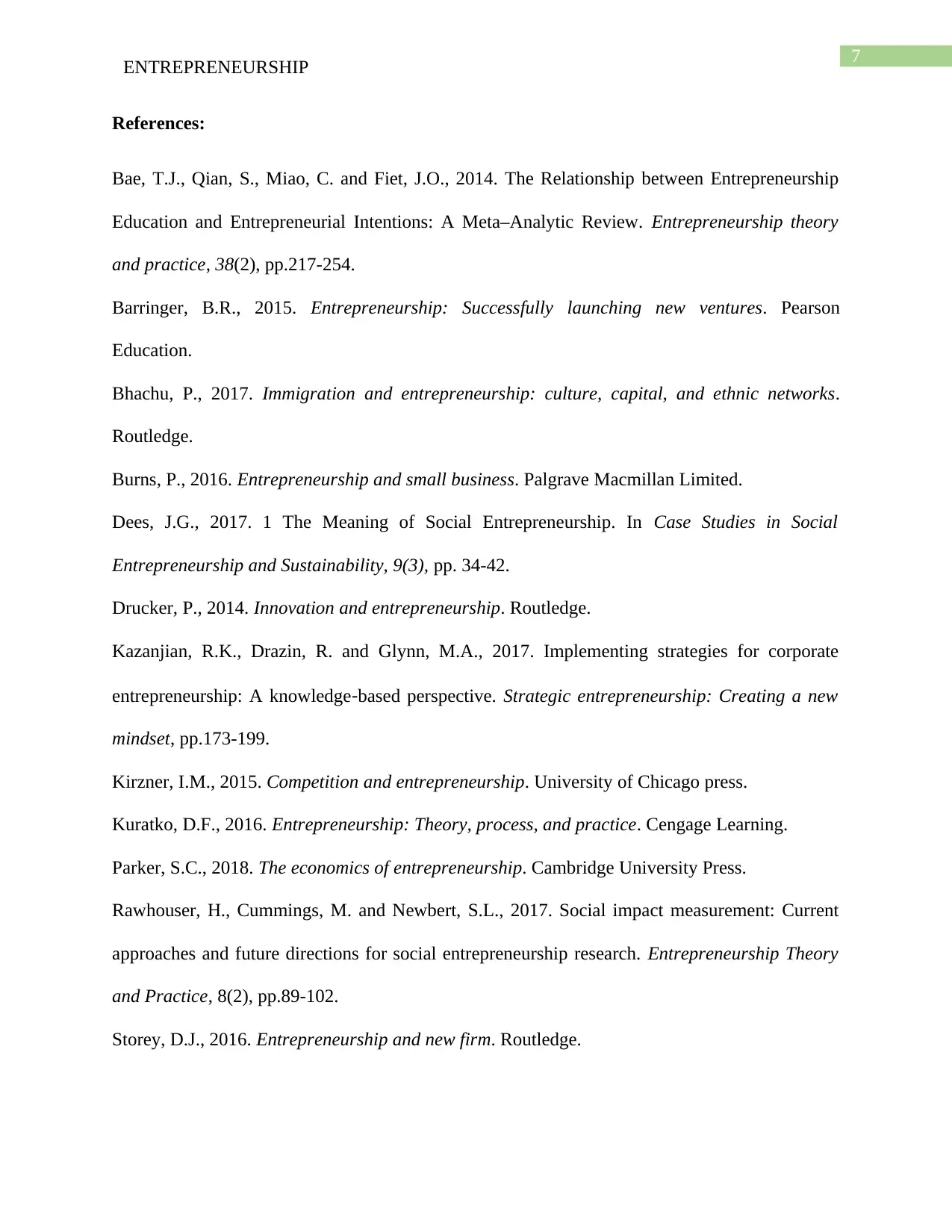
7
ENTREPRENEURSHIP
References:
Bae, T.J., Qian, S., Miao, C. and Fiet, J.O., 2014. The Relationship between Entrepreneurship
Education and Entrepreneurial Intentions: A Meta–Analytic Review. Entrepreneurship theory
and practice, 38(2), pp.217-254.
Barringer, B.R., 2015. Entrepreneurship: Successfully launching new ventures. Pearson
Education.
Bhachu, P., 2017. Immigration and entrepreneurship: culture, capital, and ethnic networks.
Routledge.
Burns, P., 2016. Entrepreneurship and small business. Palgrave Macmillan Limited.
Dees, J.G., 2017. 1 The Meaning of Social Entrepreneurship. In Case Studies in Social
Entrepreneurship and Sustainability, 9(3), pp. 34-42.
Drucker, P., 2014. Innovation and entrepreneurship. Routledge.
Kazanjian, R.K., Drazin, R. and Glynn, M.A., 2017. Implementing strategies for corporate
entrepreneurship: A knowledge‐based perspective. Strategic entrepreneurship: Creating a new
mindset, pp.173-199.
Kirzner, I.M., 2015. Competition and entrepreneurship. University of Chicago press.
Kuratko, D.F., 2016. Entrepreneurship: Theory, process, and practice. Cengage Learning.
Parker, S.C., 2018. The economics of entrepreneurship. Cambridge University Press.
Rawhouser, H., Cummings, M. and Newbert, S.L., 2017. Social impact measurement: Current
approaches and future directions for social entrepreneurship research. Entrepreneurship Theory
and Practice, 8(2), pp.89-102.
Storey, D.J., 2016. Entrepreneurship and new firm. Routledge.
ENTREPRENEURSHIP
References:
Bae, T.J., Qian, S., Miao, C. and Fiet, J.O., 2014. The Relationship between Entrepreneurship
Education and Entrepreneurial Intentions: A Meta–Analytic Review. Entrepreneurship theory
and practice, 38(2), pp.217-254.
Barringer, B.R., 2015. Entrepreneurship: Successfully launching new ventures. Pearson
Education.
Bhachu, P., 2017. Immigration and entrepreneurship: culture, capital, and ethnic networks.
Routledge.
Burns, P., 2016. Entrepreneurship and small business. Palgrave Macmillan Limited.
Dees, J.G., 2017. 1 The Meaning of Social Entrepreneurship. In Case Studies in Social
Entrepreneurship and Sustainability, 9(3), pp. 34-42.
Drucker, P., 2014. Innovation and entrepreneurship. Routledge.
Kazanjian, R.K., Drazin, R. and Glynn, M.A., 2017. Implementing strategies for corporate
entrepreneurship: A knowledge‐based perspective. Strategic entrepreneurship: Creating a new
mindset, pp.173-199.
Kirzner, I.M., 2015. Competition and entrepreneurship. University of Chicago press.
Kuratko, D.F., 2016. Entrepreneurship: Theory, process, and practice. Cengage Learning.
Parker, S.C., 2018. The economics of entrepreneurship. Cambridge University Press.
Rawhouser, H., Cummings, M. and Newbert, S.L., 2017. Social impact measurement: Current
approaches and future directions for social entrepreneurship research. Entrepreneurship Theory
and Practice, 8(2), pp.89-102.
Storey, D.J., 2016. Entrepreneurship and new firm. Routledge.
1 out of 8
Related Documents
Your All-in-One AI-Powered Toolkit for Academic Success.
+13062052269
info@desklib.com
Available 24*7 on WhatsApp / Email
![[object Object]](/_next/static/media/star-bottom.7253800d.svg)
Unlock your academic potential
Copyright © 2020–2025 A2Z Services. All Rights Reserved. Developed and managed by ZUCOL.




